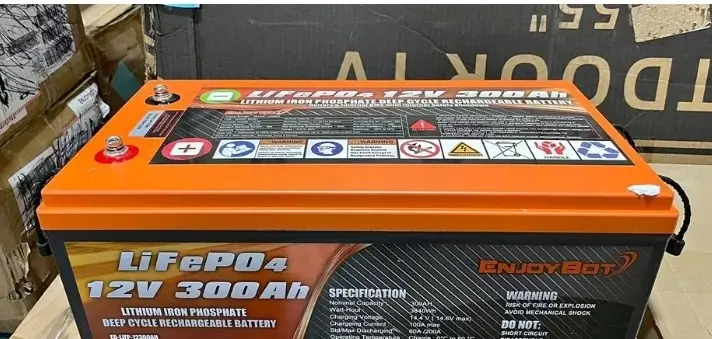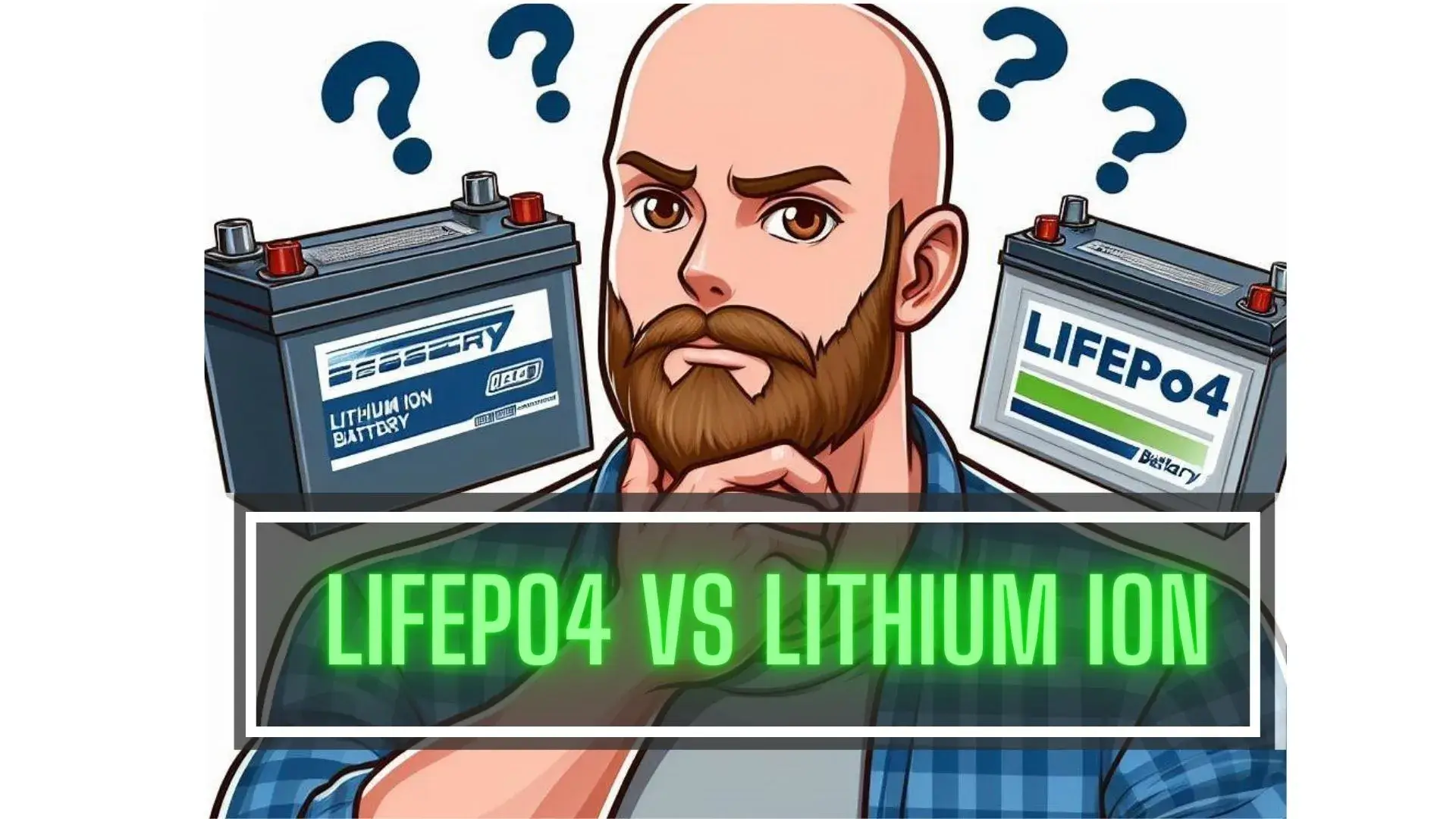LiFePO4 vs Lithium Ion Battery: How They Differ in Terms of Safety, Stability, and Energy Density. Find out the key differences and how they affect your power needs.
If you’re looking for a reliable and efficient battery to power your devices, you might be wondering which one is better: LiFePO4 or Lithium Ion? I know I was. I was confused by the technical jargon and conflicting opinions on the internet.
I wanted a simple answer that would help me make the best choice for my needs. Well, I did some research, and I found the answer. And I’m going to share it with you in this article.
The answer is it depends. It depends on what you want to use the battery for, how long you want it to last, and how much you’re willing to spend. There is no one-size-fits-all solution when it comes to batteries.
But don’t worry, I’m going to help you decide which battery is right for you. By the end of this post, you’ll be able to make an informed decision that will save you time, money, and hassle.
So, let’s get started.
| Feature | LiFePO4 | Lithium Ion |
|---|---|---|
| Energy Density | Lower | Higher |
| Weight | Lighter | Heavier |
| Lifespan | Longer (up to 10 years) | Shorter (2-3 years) |
| Charging Time | Slower | Faster |
| Maintenance | Similar requirements | Similar requirements |
| Safety | Safer, more stable | More risk of overheating/fire |
| Environment | More eco-friendly | Less eco-friendly |
| Cost | Higher upfront, cheaper long-term | Cheaper upfront, pricier long-term |
Table of Contents
Key Takeaways
- LiFePO4 batteries are a safe choice with a long lifespan. They are perfect for durable applications.
- Lithium-ion batteries have a higher energy density and are lighter. They are perfect for portable and smartphone technologies.
- To make the best choice, familiarize yourself with each battery’s features. This will help you meet your specific needs effectively.
LiFePO4 vs Lithium Ion Battery: Energy Density
How much energy can a battery store?
Well, let’s compare LiFePO4 batteries and lithium-ion batteries. Energy density is how much energy a battery can hold in a certain weight or volume.
Lithium-ion batteries have higher energy density than LiFePO4 batteries. They use lithium metal oxides in their chemistry. LiFePO4 batteries use lithium iron phosphate.
What does this mean for you?
Lithium-ion batteries can store more energy in less space. That’s down to their higher energy density. This is why many electronic devices, like smartphones, use them. As companies innovate smaller and lighter cellphones and tablets, the high energy density of li-ion makes it ideal.
Now, what about LiFePO4 batteries? Are they worse? Let me tell you that, in terms of energy density, they are.
LiFePO4 batteries have their advantages, too! They are safer due to strong covalent bonds in their cathode material. And safety is important, especially when it comes to batteries.
Specific energy is another way to measure energy storage. It’s the energy stored per unit mass. How much energy can be stored in 1 kilogram of battery? Again, lithium-ion batteries win here with higher specific energy.
So, what’s the bottom line? Lithium-ion batteries store more energy in less space, and they are lighter. LiFePO4 batteries are safe and stable but don’t have the same high energy density.
Is energy density the only thing to consider? No. There are other factors like safety, life cycle, and cost that affect our choices.
After all, you wouldn’t want a cheaper battery to explode, would you?
WINNER: LI-ION
Weight
Did you know that weight is a significant factor when comparing rechargeable batteries? When it comes to lithium-ion batteries, we need to know their weight differences.
LiFePO4 batteries are lightweight. They are often used in applications where weight is important. This means electric vehicles and some portable electronics. These batteries have an advantage in weight reduction compared to lithium-ion ones.
LiFePO4 batteries generally have a lower energy density than lithium-ion batteries. That might make you think they’re heavier, right? Wrong!
LiFePO4 batteries have a unique chemistry. They can be lighter but still provide the same power.
Now, don’t get me wrong, lithium-ion batteries also have their perks. They can store more energy in a smaller package. This is great for gadgets like smartphones and laptops. But when it comes to weight, they might fall behind LiFePO4 batteries in some cases.
WINNER: LIFEPO4
Lifespan
Let’s talk about Lifespan. How long do LiFePO4 batteries and lithium-ion batteries last? It’s important, right?
LiFePO4 batteries have a long lifespan. They can last for up to 10 years.
Now, let’s talk about cycle life. Cycle life is all about charge and discharge cycles. The more cycles, the better the battery.
LiFePO4 batteries have a high number of charge cycles. In fact, some can handle up to 2000 cycles. That’s quite good. On the other hand, lithium-ion batteries usually have fewer cycles, around 500-1000.
Here’s a quick look at some key points about the lifespan of LiFePO4 and lithium-ion batteries:
- LiFePO4 batteries:
- Long lifespan: ~10 years
- High cycle life: up to 2000 cycles
- Lithium-ion batteries:
- Shorter lifespan: 2-3 years
- Lower cycle life: 500-1000 cycles
Battery life depends on usage patterns, charging habits, and other factors. But LiFePO4 batteries have a clear win.
WINNER: LIFEPO4
Charging Time
LiFePO4 batteries and lithium-ion batteries differ in charging time. You may be curious about how they compare in this aspect. Let’s dive in and find out what sets these two apart.
LiFePO4 batteries usually have a lower charging rate than lithium-ion batteries. While this could be a disadvantage for some applications, it can be a good trade-off. The reason? Their longer lifespan.
Do you remember I mentioned that LiFePO4 batteries often have more than 2,000 charge cycles? This is one of the things making that possible.
Now, let’s talk about charge efficiency. For lithium-ion batteries, it’s usually around 80-90% efficient. But guess what? LiFePO4 batteries can boast a charge efficiency of up to 95%! This means you can get more use out of the energy that’s put into charging them.
When it comes to the self-discharge rate, both battery types perform quite well. Lithium-ion batteries generally have a slightly higher self-discharge rate. This means they lose more charge when stored for long periods. LiFePO4 batteries, on the other hand, retain their charge better.
How about discharge rates? LiFePO4 batteries can handle high-current discharge better than lithium-ion batteries. This can be essential in some applications. LiFePO4 batteries can discharge at high rates without damaging or reducing their lifespan.
When choosing between LiFePO4 and lithium-ion batteries, consider the charging time. Also, consider the charge and discharge efficiency and the self-discharge rates.
WINNER: LI-ION
Maintenance Requirements
When it comes to maintenance, LiFePO4 and lithium-ion batteries differ.
Here’s the thing: LiFePO4 batteries are known for their high energy density and long lifespan. They require proper care to perform at their best. Keeping them clean and away from extreme temperatures is essential. Regularly checking their voltage will ensure your LiFePO4’s performance.
Also, remember to store them at a partial charge when unused for long periods. Doing so helps maintain their lifespan. For more LiFePO4 maintenance tips, check out this ultimate guide.
On the other hand, lithium-ion batteries need attention too. They can suffer from overheating and swelling. Make sure they’re charged within the recommended voltage range. Avoid overcharging and over-draining these batteries.
Keep them at a partial charge if you don’t use them for some time. Don’t expose them to extreme temperatures, as it can shorten their life. Dispose of them properly when they reach the end of their lifespan.
WINNER: DRAW
Safety
When it comes to choosing a battery, safety is my number one priority. So, what makes LiFePO4 batteries safer than lithium-ion batteries? Let me explain.
As I mentioned earlier, LiFePO4 batteries contain strong covalent bonds. These bonds exist between iron, phosphorus, and oxygen atoms in the cathode. These strong bonds make LiFePO4 batteries are more stable and less likely to overheat.
Overheating is a significant problem in lithium-ion batteries. Thermal runaway is when a battery’s temperature spirals out of control. This can lead to battery fires. LiFePO4 batteries have thermal and structural stability, reducing fire risk. Thankfully, they are less likely to catch fire than other batteries.
Lithium-ion batteries, on the other hand, are known for their risks. Remember the exploding smartphone fiasco? That’s right, lithium-ion batteries were to blame!
When short-circuiting happens, they can overheat and catch fire. They can also catch fire if exposed to high temperatures.
The good news is that LiFePO4 batteries have a built-in safeguard against short-circuiting.
WINNER: LIFEPO4
Environmental Considerations
LiFePO4 batteries are more eco-friendly than lithium-ion batteries. They contain no harmful materials, last longer, and use less energy. They’re made of lithium, iron, and phosphate ions, which are relatively harmless and abundant. LiFePO4 batteries can last up to 10 years, while lithium-ion batteries last around 2-3 years.
LiFePO4 batteries have a lower self-discharge rate, which means they retain their charge longer and consume less energy. By choosing LiFePO4 batteries, you can enjoy the benefits of reliable and efficient power while also protecting the planet.
WINNER: LIFEPO4
Cost
When comparing LiFePO4 and lithium-ion batteries, cost is an important factor to consider. So, let’s dive into the costs of these batteries!
LiFePO4 batteries may have a slightly higher initial cost than lithium-ion batteries. This is because they’re newer and there are fewer manufacturers.
The good news is that LiFePO4 batteries have a longer lifespan. This means they’re more cost-effective in the long run. You won’t have to replace them as often as lithium-ion batteries.
Now, let’s talk about raw materials. Both LiFePO4 and lithium-ion batteries use lithium. But LiFePO4 batteries also use iron phosphate. These materials are generally less expensive and more abundant. This can help reduce the cost of LiFePO4 batteries.
In comparison, lithium-ion batteries rely on other materials like cobalt and nickel. The prices of these materials can change. This change can impact lithium-ion battery costs.
Finally, efficiency plays a role in cost as well. LiFePO4 batteries have a lower self-discharge rate than lithium-ion batteries. This means they’re able to hold their charge longer. So, you’ll get more bang for your buck!
LiFePO4 Applications

LiFePO4 batteries are becoming increasingly popular, and for good reason. They have several advantages over traditional Lithium-ion batteries in various applications. As a writer, I find it essential to explore the different uses of these batteries. Let’s dive in!
One of the primary applications of LiFePO4 batteries is in solar power systems. They are a perfect choice for off-grid living and stationary power solutions. These creatures have a long life span. They can store lots of energy. They are perfect for green energy users. Additionally, being eco-friendly adds to their appeal. Imagine powering your home and appliances with clean, sustainable energy. It’s now possible!
Recreational vehicles have also become a big market for LiFePO4 batteries. RV owners need additional power to run their devices. They want to have enough power while exploring. With LiFePO4 batteries, you won’t run out of power on adventures.
Climate-controlled spaces can benefit from LiFePO4 batteries as well. They perform admirably even in extreme temperatures.
So, whether it’s a scorching summer or a freezing winter, these batteries won’t let you down. Trust me; your energy needs will be met, no matter what the weather is like outside.
Li-ion Applications
| Application | LiFePO4 | Lithium Ion |
|---|---|---|
| Solar Power Systems | Common | Sometimes Used |
| Recreational Vehicles | Common | Rarely Used |
| Climate-Controlled Spaces | Effective | Can Struggle in Extreme Temps |
| Phones/Portable Electronics | Rarely Used | Very Common |
| Electric Vehicles | Sometimes Used | Very Common |
Lithium-ion batteries are also popular, and for good reason! They’re in so many devices we use daily. Have you ever noticed how your phone relies on batteries? Let’s dive into the various applications of lithium-ion batteries.
Lithium-ion batteries often power phones and other portable electronics. These small batteries are long-lasting and keep our devices running all day. With their high energy density, it’s no wonder they’ve become the go-to choice for our phones.
But it doesn’t stop there. Electric vehicles, like cars and motorcycles, also rely on lithium-ion batteries. They provide enough power for a smooth and enjoyable ride. And did you know electric motorcycles have become more popular than ever? They’re quieter, eco-friendly, and a crazy ride – all thanks to lithium-ion batteries!
Solar systems are another great example of lithium-ion batteries in action. Storing energy from the sun needs a consistent and reliable battery. Lithium-ion batteries can store more energy without taking up too much space. This means they’re also often used for solar installations.
Before You Go…
You might have learned a lot about LiFePO4 and lithium-ion batteries. They are different from each other. You might have chosen which one is better for your needs and how to use it correctly. But there’s one more thing that you need to know, and that’s how to charge and maintain your batteries.
Have you encountered battery chargers and maintainers? Do you know their purpose and function? Do you know which one you need for your batteries and how to select the best one? Do you know how to avoid common pitfalls when charging batteries?
Well, I have the answer for you. In my next post, I will explain the difference between a battery charger and a battery maintainer. I will also help you select the right one for your batteries. I will tell you what they are, how they work, and what they do. I will tell you the benefits and drawbacks of using them. I will provide you with the best practices and advice for using them.
You’ll be glad you read this, especially if you want to extend the life and performance of your batteries.
Frequently Asked Questions
Here’s the FAQs.
What are the main differences in charging LiFePO4 vs lithium-ion batteries?
LiFePO4 batteries generally require a different charging voltage compared to lithium-ion batteries. Lithium-ion batteries usually require a higher charging voltage. In contrast, LiFePO4 batteries can be charged with a lower voltage. This means that they may charge faster and can be more energy-efficient. Always check the recommended charging settings for your specific battery type. This will help you avoid damaging it.
Which battery type has a longer lifespan: LiFePO4 or lithium-ion?
LiFePO4 batteries often have a longer lifespan than lithium-ion batteries. Under ideal conditions, these batteries can offer up to 10,000 charge cycles. In comparison, lithium-ion batteries usually provide fewer cycles. That’s why people tend to choose LiFePO4 batteries for applications requiring long-term use.
How do energy densities compare between LiFePO4 and lithium-ion batteries?
When choosing a battery, energy density is important. It relates to how much energy the battery can store based on size or weight. Lithium-ion batteries usually have higher energy densities compared to LiFePO4 batteries. If you need a small and light battery, choose lithium-ion. It stores lots of energy.
Are there any major disadvantages to using LiFePO4 batteries compared to lithium-ion?
Yes, there are some drawbacks. LiFePO4 batteries have a lower energy density than lithium-ion batteries. That can mean bulkier and heavier batteries for the same energy storage capacity. LiFePO4 batteries can be sensitive to temperature extremes. This sensitivity can affect their performance in hot or cold environments.
Can I directly replace a Li-ion battery with a LiFePO4 battery?
It’s possible but not always recommended. LiFePO4 batteries and lithium-ion batteries have different voltage outputs. They also have different charging requirements. You may have to change the device or charging system. This is to fit the differences. Before making changes, check if your device is compatible with the replacement battery.
Is the cost of LiFePO4 batteries generally higher or lower than lithium-ion batteries?
Initially, LiFePO4 batteries might be more expensive than lithium-ion ones. They could provide a more cost-effective solution in the long run. This is because they have a longer lifespan and improved safety features. Before making a decision, consider your specific application. Weigh the short-term and long-term benefits of each battery type.
This site was built using the teaching of the Authority Hacker training course. Check out my review here.


